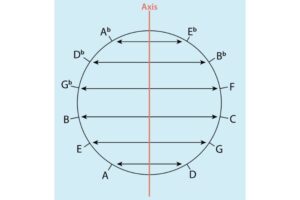Music is a powerful tool. It can calm you down, make you feel energized and excited, and even help you get through tough times. But sometimes, music without lyrics can be just as great as music with lyrics. What is music without lyrics called?
Music without lyrics is called instrumental music. Instrumental songs are often considered “background music” because they don’t have lyrics. This type of music can be soothing, exciting, or even sad but doesn’t necessarily tell a story.
Read on to learn more about music without lyrics, its different types, a few popular songs without vocals, and many more!
What Is Music Without Lyrics Called?

Instrumental music refers to music without lyrics. Musicians can play it on any instrument to create moods or feelings in films and TV shows. Operas and musicals use instrumental music to complement lyrics and vocals.
An Excellent Way of Self-Expression
Instrumental music is a great way to express yourself without using words. It’s a fantastic way to focus on one aspect of music and learn more about it.
For example, you can start to play instrumental music if you want to learn how to play the violin or guitar because there aren’t any lyrics that might distract you.
Popular in Many Music Genres
Instrumental music is popular in many genres, including classical, jazz, and rock. It’s often used as background music for movies and TV shows because it can create a mood without distracting viewers from what’s going on in front of them.
Can Be Performed by Soloists or an Ensemble
A soloist or an ensemble can perform instrumental songs. In the case of a soloist, many different instruments can be used, such as the piano, violin, and guitar. And if it’s an ensemble, then it could be anything from a big band to an orchestra.
Regarded as the Purest Form of Music
It’s also called instrumental music because it doesn’t rely on lyrics to tell a story or convey meaning. Instrumental music is often thought of as the purest form because it relies solely on the composer’s unique vision and talent.
Other Terms Used for Music Without Lyrics
“Song without vocals” is another way of saying it, and “music without words” is another. “Music without vocals” or “songs without words” are other ways you’ll see it written.
What Is the Point of Instrumental Music?
Vehicle for Creativity
Instrumental music can be a vehicle for creativity. It’s also a way to challenge your brain by encouraging you to listen closely so you can tell a story about what you hear.
If you think about it, instrumental music has always been used to help people express themselves creatively.
Translates a Story or Feeling into Song
It enables artists and other people to create things that are not restricted by lyrics or words. They can imagine a story or feeling and put that story into a song.
Similar to Poetry
In this sense, instrumental music is similar to poetry — it’s all about interpretation and imagination, making it a great way to express oneself.
What Are the Most Used Instrument in Instrumental Music?
Instrumental music can be played on a variety of instruments. The most common instruments used in instrumental music are as follows:
- Guitar
- Piano
- Violin
- Flute
- Saxophone
- Drums
- Synths
Not only can these instruments be played by themselves, but they can also be combined to create a larger piece of music.
What Are the Types of Instrumental Music?
There are several types of instrumental music, including the following:
1. Classical Music
This type of instrumental music has been around since the 18th century. In most cases, classical music does not include any lyrics or vocals. It has a variety of musical forms, including symphonies, concertos, sonatas, chamber music, and opera.
Classical music comprises a series of movements, each with its tempo, style, and key signature. The movements are usually performed by an orchestra but can also be performed by a soloist or a smaller ensemble.
Legendary names like Bach, Beethoven, Tchaikovsky, and Mozart also come to mind when discussing classical instrumental music.
2. Jazz Music
Jazz music is a type of instrumental music that originated in the early 1900s in New Orleans and gained popularity throughout the United States and Europe.
In jazz, musicians improvise melodies while playing over a set chord progression. Jazz has been influenced by many other genres, including blues, which African Americans also created in the rural south.
3. Bluegrass Music
Bluegrass music is another instrumental music that originated in the southern United States. It is played with acoustic musical instruments, and its style can be described as a mixture of old-time music, blues, and country. Some even describe bluegrass as the metal version of country music.
Bluegrass songs may or may not have lyrics. The following names are synonymous with virtuosic bluegrass music:
- Bela Fleck
- Noam Pikelny
- Strength in Numbers
4. Instrumental Punk (Post-Punk)
Instrumental punk is a type of instrumental music that uses the energy of punk rock to create an aggressive sound. This style of music was popularized in the late 1970s and 1980s, but it’s still used today by some artists as an alternative to vocals when creating their music.
Post-punk music may or may not feature vocals. It’s a great blend of different techniques and influences from various musical genres.
Instrumental punk music is usually played on the following instruments:
- Electric guitars
- Bass guitars
- Synthesizers
- Drum machines
- Other instruments that create aggressive sounds
5. Instrumental Rock (Post-Rock)
Rock music that emphasizes more on an instrument is known as post-rock or instrumental rock. It does not include any singing or vocals, and the melody is produced by the solo instrument, which is often an electric guitar played with a shredding melody.
Post-rock music typically features traditional rock instruments, such as electric guitar, drums, and bass. But other accessories are also a must, including:
- Slides,
- E-bows, and
- Reverb.
Post-rock has had somewhat of a resurgence in recent years because of the efforts of bands like:
- Explosions in the Sky
- Sigur Rós
- God Is an Astronaut
The absence of vocals and the reliance on the instruments’ melodies to convey meaning make this style one of the most attractive types of music.
6. Instrumental Metal (Post-Metal)
Instrumental metal, sometimes known as post-metal, shares many similarities to post-rock. It emerged about the same time as post-rock, and its popularity has only increased.
Post-metal tracks typically do not have vocals, and guitars usually lead to the forefront of the musical composition.
The tones and song structure are comparable to progressive metal, characterized by aggressive rhythms, heavily distorted guitars, and a great deal of rhythmic variety, including complex riffs, solos, and melodies.
Among the most well-known representatives of the post-metal genre are bands such as:
- Russian Circles
- Rosetta
- Cult of Luna
7. Electronic Dance Music (EDM)
“Electronic dance music” refers to various percussive electronic music genres frequently played at nightclubs, raves, and festivals. DJs are responsible for producing the music by putting together a mix of different tracks.
EDM includes a range of subgenres like:
- Techno
- House music
- Dubstep
- Trance
It is common for EDM to lack vocals or lyrics. But this varies depending on the subgenre, the specific song, and the artist. The emphasis is placed more on the beats and the rhythm of EDM music than the lyrics or the melodies because these songs are intended to be danced to.
A few of the most influential DJs in the electronic dance music genre include:
- The Swedish House Mafia
- Tiësto
- Martin Garrix
- Armin van Buuren
8. Film Music
This type of instrumental music is produced and recorded for use in a film. Film music has been around since the beginning of cinema and has a rich history. It’s typically composed for a specific scene or purpose, and it’s meant to evoke certain emotions in the viewer.
There are many different types of film music: horror, comedy, drama, thriller, romance… you name it! The kind of film music you’ll hear in any movie depends on the story the director wants to tell.
9. Low Fidelity (Lo-Fi)
Instrumental music predominates in Lo-fi culture. Lo-fi is an abbreviation for “low fidelity.” It refers to a type of music production that celebrates musical flaws rather than striving for absolute perfection in the recording process.
Harmonic distortion and analog warmth are two essential components of this DIY music genre.
The 1990s saw the rise of lo-fi music, which became famous as musicians began producing songs in their homes. In lo-fi music, the presence of misplayed notes, background noises, and phonographic flaws, such as signal cuts and tape hiss, are encouraged.
As the term “lo-fi” refers more to a production technique than it does to a particular genre, the sound of lo-fi music can be similar to any genre, from rock to hip-hop. Some well-known artists who work in this style include:
- The Beach Boys
- Paul McCartney
- Todd Rundgren
- R. Stevie Moore
10. Ambient Music
This instrumental music features very little in lyrics, melody, and rhythm. Ambient music usually consists of synthesized or recorded sounds mixed to create an atmosphere that induces feelings related to peace, relaxation, and serenity.
Three notable artists who have contributed to the ambient music genre are:
- William Basinski
- Brian Eno
- Stars of the Lid
Because it is an excellent style for passive listening, you can play ambient music at establishments like cafes, shopping malls, stores, airports, and other public venues.
Instrumental ambient music has different subgenres, including:
- Ambient house
- Downtempo
- Ambient techno
- New age
- Space music
Again, what is music without lyrics called? Instrumental music refers to music without lyrics. You can make instrumental songs by recording while playing an instrument, making synthesized music, etc.
What Is the Best Music While Studying?

Improves Memory and Concentration
Listening to music is one of the best ways to help people study. It’s been shown to reduce stress, improve memory, and even help you focus. But not all music is created equal.
It would help if you found the right music for studying — one that doesn’t distract you from your task but helps you focus on it. And one method to do this is by listening to music without lyrics.
Lyrics can be distracting because they can draw your attention away from what you’re trying to learn or remember.
Classical Instrumental Music Is Best
Some believe instrumental music helps them concentrate more than any other type of music. And some people even say that listening to songs without lyrics helps them get into a more productive mindset.
A 2014 study says that older adults who listen to classical instrumental music tend to have better memory and improved processing tasks.
Popular Music Without Lyrics
The world of music is about more than just words. Some songs don’t even have lyrics at all. And while it’s rare for instrumentals to become big hits or even break the Billboard charts, a few have made it to the top!
Here’s a list of some of our favorite popular instrumental songs without lyrics:
- Electric Worm – Beastie Boys (2007)
- Cliffs of Dover – Eric Johnson (1990)
- Sirius – The Alan Parsons Project (1982)
- Eruption – Van Halen (1978)
- A Fifth of Beethoven – Walter Murphy and The Big Apple Band (1976)
- Black Mountain Side – Led Zeppelin (1969)
- Soul Sacrifice – Santana (1969)
- Albatross – Fleetwood Mac (1968)
How to Find Music Without Lyrics
Trying hard to remember a song without vocals? No worries! Thanks to modern technology, that’s no longer a problem! You can now find the name of any song with just a few taps:
1. Google App
Google will let you hum part of a song and see what your phone or device thinks it is. That way, you can quickly discover what song is stuck in your head and sing along with it anytime you want. How cool is that? This service is also available on both Android and iOS devices.
Using the Google app, tap the mic icon on the search bar. You can whistle, sing a melody, play a part of the song, or hum to search for any song.
2. Midomi
Midomi is a music recognition service that uses an online database to match the lyrics of a song you hum or sing to the actual title of the song. There are other song-identifying services, but Midomi is one of the most popular because it’s free and easy to use.
3. Shazam
Shazam is an audio recognition app that uses your phone’s microphone to identify music playing near you.
It’s great when you hear a song on the radio or in a restaurant and want to know what it is so you can download it later. However, Shazam only works with pre-recorded music, not live concerts or performances.
4. AudioTag
AudioTag is another free music recognition service that lets you quickly recognize practically any unidentified piece of music. Also, it’s pretty easy.
Just upload a short audio clip (e.g., a 10-sec. fragment) or an entire song, then let the robot analyze it to obtain information such as the track title, artist name, and album title, among other things.
Frequently Asked Questions – What Is a Song Without Vocals Called?

What Is an Instrumental Version?
An instrumental version is a recording of a piece of music with no vocals. The term often refers to a cover or remix of another song, but it can also refer to an original work composed for voice and instruments only.
What Is Considered Instrumental Music?
Instrumental music is a recording without using any vocals. However, it might include inarticulate, like backup vocals in a big band setting.
Is Instrumental Music a Genre?
Instrumental music isn’t a genre. But it’s used within other genres like folk, classical, and rock music.
Why Do People Love Instrumental Music?
Your brain will have more time to contemplate and roam through different thoughts while listening to instrumental music. You’ll notice that your mind gradually gets calmer and quieter as you spend time processing ideas. In today’s media-saturated age, this kind of reflection can be refreshing.
What’s the Difference Between Vocal and Instrumental Music?
Vocal music has lyrics, whereas instrumental music has no lyrics or words.
What Is the Opposite of Instrumental Music?
Instrumental music doesn’t involve vocals, so the opposite would be music that involves vocals but lacks instruments. This form of music is called “a cappella.”
Its popularity has fluctuated over the years, but it’s a form of music that has been around for centuries. A cappella music is often associated with choir groups, but other groups can perform this type of music.
Conclusion – What Is Music Without Lyrics?
Music without lyrics is instrumental, which can be beautiful, haunting, relaxing, and inspiring. It doesn’t need words to tell a story or make you feel something because it does so with the power of its melodies and harmonies.
We hope this article has shown you the power of instrumental music and that it’s opened your mind to the possibility of enjoying it.
Read next:
Chaconne Vs Passacaglia – What Is the Difference Between Them?



![Best Vietnamese Songs [Top 20 Most Popular] Best Vietnamese Songs](https://musicalinstrumentpro.com/wp-content/uploads/2021/11/best-vietnamese-songs-150x150.jpg)





